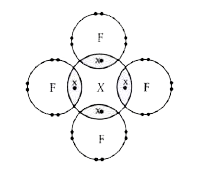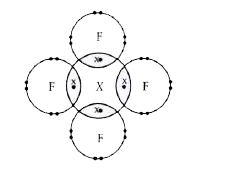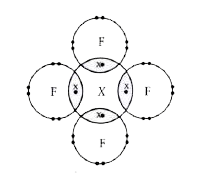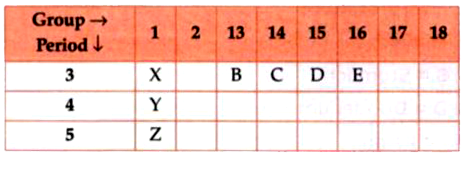The given diagram shows the electron arrangement in a compound formed between an element X and fluorine.

In which group of the periodic table can you find element X?
Element X has four valence electrons hence, it belongs to group 14 of the periodic table.
Topper's Solved these Questions
- PERIODIC CLASSIFICATION OF ELEMENTSBOOK - MTG IIT JEE FOUNDATIONCHAPTER - PERIODIC CLASSIFICATION OF ELEMENTSEXERCISE - Exercise (Subjective Problems) (Long Answer Type)
13 Videos
- PERIODIC CLASSIFICATION OF ELEMENTSBOOK - MTG IIT JEE FOUNDATIONCHAPTER - PERIODIC CLASSIFICATION OF ELEMENTSEXERCISE - Exercise (Integer/Numerical Value Type)
5 Videos
- PERIODIC CLASSIFICATION OF ELEMENTSBOOK - MTG IIT JEE FOUNDATIONCHAPTER - PERIODIC CLASSIFICATION OF ELEMENTSEXERCISE - Exercise (Subjective Problems Very Short Answer Type)
26 Videos
- MOLE CONCEPT, STOICHIOMETRY AND BEHAVIOUR OF GASES BOOK - MTG IIT JEE FOUNDATIONCHAPTER - MOLE CONCEPT, STOICHIOMETRY AND BEHAVIOUR OF GASES EXERCISE - EXERCISE (INTEGER/NUMERICAL VALUE TYPE)
5 Videos
Similar Questions
The given diagram shows the electron arrangement in a compound formed between an element X and fluorine.

What is the formula of this compound?
View SolutionThe given diagram shows the electron arrangement in a compound formed between an element X and fluorine.

Is this an ionic or covalent compound? Give your reason.
View Solution
Knowledge Check
An element X forms an oxide X2O3. In which group of Mendeleev's periodic table is this element placed ?
AGroup IIBGroup IIICGroup VDGroup VIII
An element 'X' belongs to the third period and group 16 of the periodic table. Find out the valency of X?AValency = 0BValency = 2CValency = 1DValency = 3The given diagram shows the electron arrangement of two elements, A and B.

By considering the following information, identify the correct option.
(i) A is a period 3 element.
(ii) B is a group III element.
(iii) Both A and B have strong metallic characteristics.
(iv) Both A and B form positive ions.AOnly (ii)BOnly (i) and (ii)COnly (iii) and (iv)D(i), (ii), (iii) and (iv)
An element X is in group 13 of the periodic table. What is the formula of its oxide?
View SolutionHow does the tendency of elements to lose electrons change in a group of the periodic table ?
View SolutionWrite down the electronic configuration of an element with atomic number 14. Which group in the periodic table does this element belong to ?
View SolutionUsing the periodic table, predict the formula of compound formed between an element X of group 13 and another element Y of group 16.
View SolutionAn element X combines with oxygen to form an oxide XO. This oxide is electrically conducting.
(a) How many electrons would be there in the outermost shell of the element X?
(b) To which group of the periodic table does the element X belong?
(c) Write the formula of the compound formed when X reacts with chlorine.
View Solution
